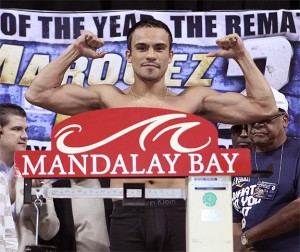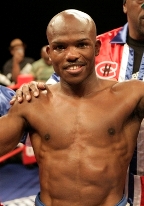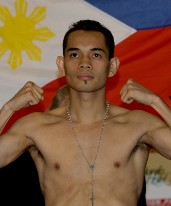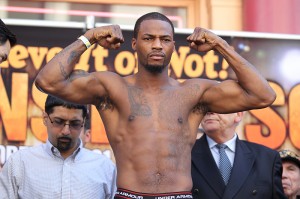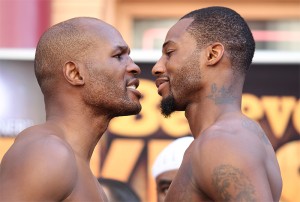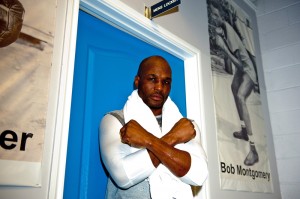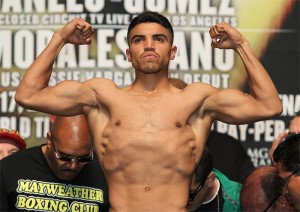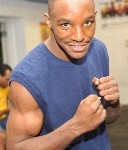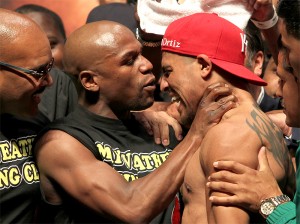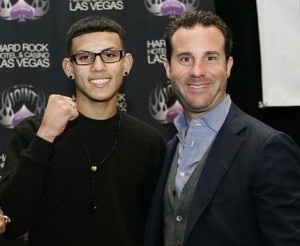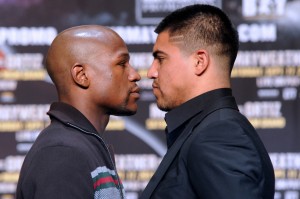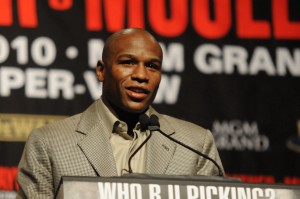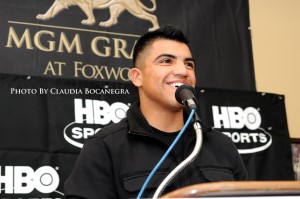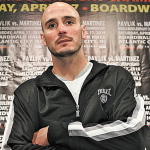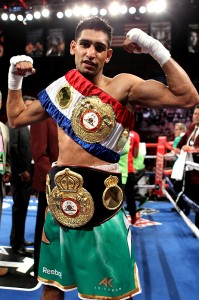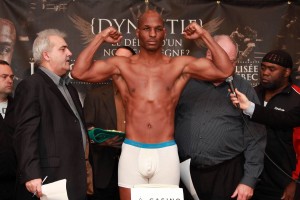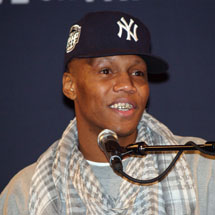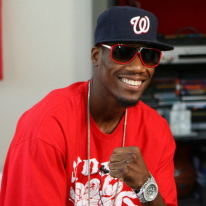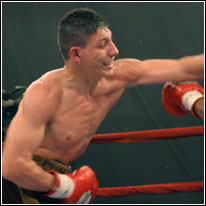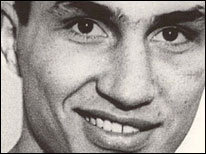Marquez’ coach has many names, but he isn’t hiding behind any of them or anywhere else
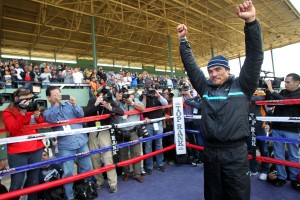
LAS VEGAS – Juan Manuel Marquez’ strength coach has been called controversial. He’s been called a couple of other things too, including two different last names, once Heredia and now Hernandez. He’s always been Angel, yet with a devil in his past. He testified during the BALCO scandal that he supplied performance enhancers to Olympic track-and-field medalists.
The guess was that he was hiding behind an alias.
But guess what? He wasn’t hiding at all Wednesday. Hernandez or Heredia or none of the above was front and center at the most public of places, a formal news conference at the MGM Grand for the third Marquez fight with Manny Pacquiao Saturday night.
Marquez even introduced him, or at least thanked him.
“Memo Hernandez” Marquez called him as stood at the podium and gestured toward the strength coach’s seat near the stage and suddenly in the spotlight.
Memo to everybody else: Marquez is forthright and open about working with the coach of many names and controversies. Perhaps, it’s an attempt to erase the speculative cloud about whether something more than pumping iron went into the bodywork that has re-defined his appearance. The Marquez camp is acting as if it has nothing to hide. It’s the smart move, but that doesn’t necessarily mean the speculation will subside. It never does. Ask Lance Armstrong.
“I want to make clear I have done a clean preparation for this fight, like I always have done,’’ Marquez said in Spanish translated into English by his promoter, Fernando Beltran.
In terms of integrity, Marquez’ record is unquestioned. But circumstances have created an almost inescapable web. Boxing fans and conspiracy theorists are almost one and the same. Without conspiracies, the game’s history just wouldn’t be what it is.
The contracted weight for Saturday is 144 pounds. Marquez has been at more than 140 pounds only once and that was in a one-sided loss by decision to a bigger Floyd Mayweather Jr. in 2009. He says he trained the wrong way to get ready for the jump up in weight. It left him sluggish. He then fought at 133 pounds, 134 and 138 in victories over Juan Diaz, Michael Katsidis and Likar Ramos.
Then, the work began for Pacquiao, who took a split decision from him at 130 pounds in 2008 and fought him to a draw at 126 in 2004. Marquez said he would train differently for the third fight against Pacquiao, his second attempt at fighting at a weight north of 140. Enter Hernandez, who was Heredia when he testified that he gave performance enhancers to Marion Jones and Tim Montgomery.
The controversy erupted when Victor Conte, who went to prison for his role in the BALCO, spotted him on HBO’s 24/7. In a tweet, Conte, who works with Nonito Donaire and Andre Berto, revealed that Hernandez had another name and links to the scandal.
Hernandez, who has a degree from Texas A&M, said Wednesday that he is suing Conte for defamation. He also ripped Conte, calling him a hypocrite.
“The guy has not only been convicted,’’ Hernandez said. “He’s a liar. It’s obvious he’s jealous. Because I’m part of boxing today, I guess he feels I’m competition again. His athletes could wind up being mine. He’s always been jealous.’’
Hernandez theorized that his college degree might a reason for that jealousy.
“He doesn’t have a degree,’’ Hernandez said.
Marquez said the strength training designed by Hernandez has involved weight-lifting, but in variety of ways and at changing weights. The idea is to retain his quickness while adding power.
Hard to do, says Pacquiao. Maybe impossible, says Pacquiao’s surprised trainer, Freddie Roach.
“I thought he’d come in at 135 and use his speed and counter-punching against Manny,’’ Roach said. “They moved in a different direction by getting bigger.”
If he has added muscle and sacrificed speed, Roach suggests Marquez will be in trouble against Pacquiao, who has added a potent right hand to power that dropped Marquez three times in the opening round of their first fight.
“I don’t think he’s going to be able to get up from this Manny Pacquiao punch,” Roach said.
A one-punch knockout from Pacquiao might be the only answer to any of the drug questions floating around in the dwindling days before opening bell. But Marquez, an astonishing 7-to-1 underdog late Wednesday, says it won’t happen, in large part because of the work he did with Hernandez. Or is that Heredia?
“My name is this,’’ Hernandez said as he tried to explain the name game in HBO 24/7. “My name is very long. My first name is Angel. I have a middle name, which is Guillermo. But in Mexico, they use ‘Memo,’ which is my nickname. Heredia, for some people, it’s very difficult for them to catch up.
“You can ask anybody here in the media sometimes they call me Heredia. Dr. Heredia. For some reason, I told you guys Hernandez, and it was easier for you guys to write it down.”
Next time, we’ll write it down with a pencil that comes with a very eraser at the opposite end. You never know when it’s going to change.
